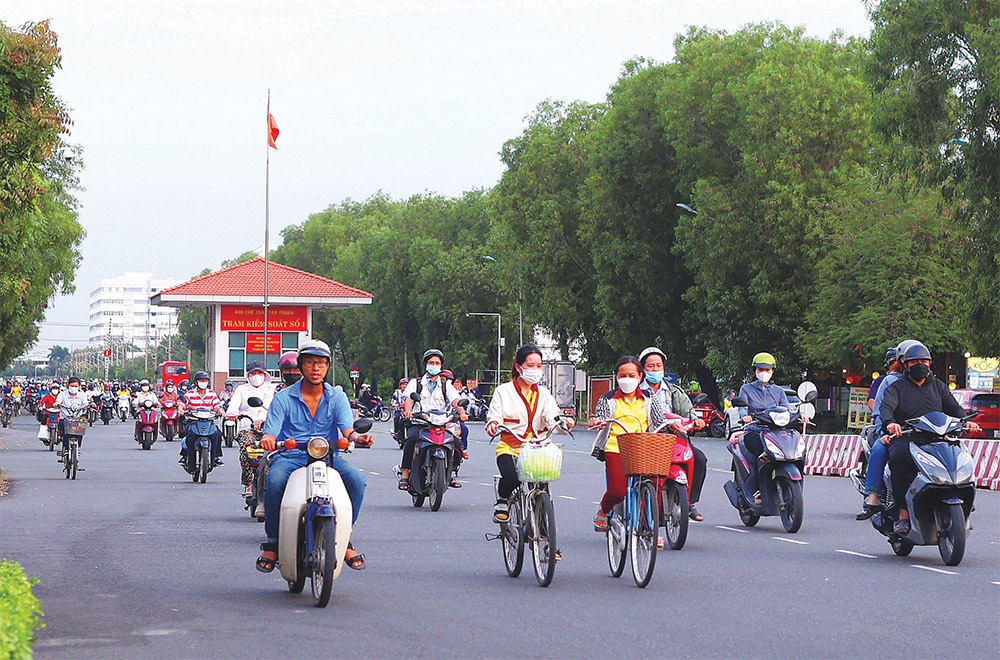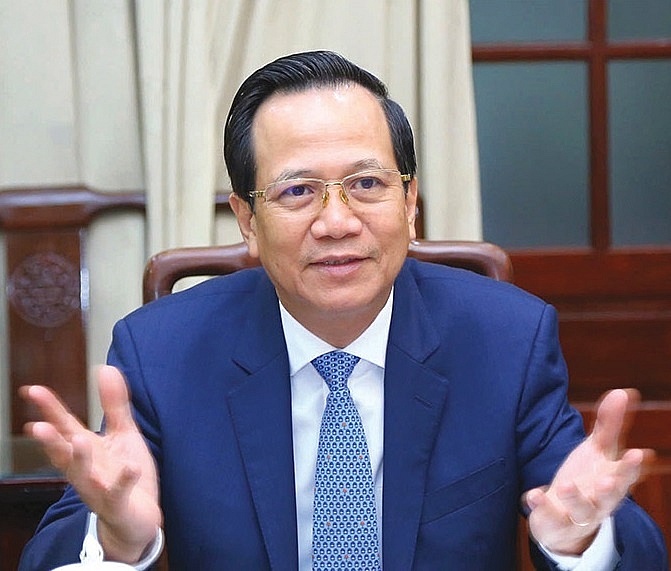Labour market equipped to take its next major leap
At the 2024 year-end review and 2025 plan conference held last week, the Ministry of Labour, Invalids, and Social Affairs (MoLISA) reiterated its commitment to developing the labour market and regulating the market.
Le Van Thanh, Deputy Minister of Labour, Invalids, and Social Affairs, said that the labour market in 2024 showed was strong, evidenced by the increase in new businesses and jobs, as the unemployment rate decreased.
In 2024, there were 162,500 new businesses, and employment reached 51.4 million workers, an increase of 212,000, according to the General Statistics Office. Urban unemployment fell 2.38 per cent. The proportion of the workforce with training reached 68.7 per cent, with 28.1 per cent having a degree or certification.
In terms of wages, the public sector saw a 30 per cent increase, while those in the private sector rose by over 6 per cent.
“The key task for the labour sector in 2025 is to develop circulars and decrees guiding the implementation of the Employment Law once it is passed at the ninth National Assembly session,” said Thanh. “The growth target for 2025 is high, so production must be accelerated, which will drive an increased demand for labour. The labour sector needs to regulate the market and prevent labour shortages.”
According to Le Quang Trung, former deputy director of the Employment Department at the MoLISA, 2025 will offer socioeconomic advantages for labour market growth, with various industries generating many job opportunities and attracting workers.
“Industries related to infrastructure, export manufacturing, AI, digital transformation, robotics, cybersecurity, accounting, and services such as machinery maintenance are expected to face a strong demand for labour,” Trung said.
According to a May 2024 report by the Semiconductor Industry Association of the US, Vietnam will experience strong growth in chip assembly, testing, and packaging, with its global market share increasing from 1 per cent in 2022 to 8 per cent by 2032. This means demand for labour will also rise, particularly in the semiconductor and IT sectors.
Meanwhile, sectors such as logistics, transportation, and trade services are also expected to perform well, creating many job opportunities.
A 2024-2025 recruitment market report published by Top CV in December showed that while the labour market last year experienced various fluctuations, many sectors are expected to continue facing labour shortages.
Some 62.5 per cent of surveyed representatives explained that boosting business activities and market growth was essential. To achieve this, nearly half of respondents selected sales as a priority recruitment target, particularly for staff with 2-3 years of experience.
Dr. Nguyen Thi Lan Huong, former director of the Institute of Labour Science and Social Affairs, said that the labour market will see growth due to economic development, an increase in foreign investment, and a corresponding rise in demand for labour.
Huong also highlighted several challenges. “There will be many job opportunities for workers, but they will require high levels of technical expertise. To meet the needs of businesses, workers must have skills, technical qualifications, and experience,” she said.
According to the Vietnam Salary Guide 2025 by ManpowerGroup, the semiconductor industry is emerging as a bright star. The country is becoming a market of potential for global semiconductor manufacturers, thanks to competitive labour costs, incentives from the government, and increasing foreign funding.
 |
In 2025, recruitment in the semiconductor industry will focus on three areas: increasing demand for skilled engineers, enhancing emphasis on research and development roles to drive innovation, and investing in the development of local talent. The industry is also predicted to be generous in terms of bonuses in 2025, reaching up to one-third of annual salary.
ManpowerGroup Vietnam forecasts that the trend of green jobs as part of environmental, social, and governance (ESG) criteria will increase significantly. More companies are prioritising technology upgrades, digitalisation, AI, and automation, as well as sustainable practices.
“This focus is driving high recruitment demand in areas such as digital, ESG, risk management, and compliance,” said Simon Matthews, regional manager for ManpowerGroup Southeast Asia. “Only 9 per cent of businesses in the Asia-Pacific region have the right talent to achieve ESG goals. We believe that this trend will increase even more in the coming year.”
ManpowerGroup’s data also showed that the demand for green talent is currently high in industries such as manufacturing, technology, energy, transportation and logistics, and agriculture. Many workers also have a positive outlook on the labour market in the upcoming year.
The 2025 Salary Survey by recruitment agency Robert Walters showed that 73 per cent of Vietnamese workers are optimistic about their career prospects in the coming year.
Faced with increasingly fierce competition and changes in workers’ priorities, 82 per cent of surveyed companies stated that they will adjust salaries up in the coming year. The expected increase is projected to range from 15 per cent to 25 per cent across most industries.
Furthermore, 76 per cent of surveyed companies declared that they will enhance their bonus schemes, while 67 per cent are focusing on investing in comprehensive training and development programmes to attract and retain talent.
| According to the General Statistics Office, the labour market gradually returned to normalcy in 2024. The labour force aged 15 and above reached 52.5 million people, an increase of 210,600. The labour force participation rate stood at 68.5 per cent, remaining high and reflecting the positive economic recovery. The number of workers in agriculture, forestry, and fisheries decreased to 13.7 million people (accounting for 26.6 per cent), a decrease of 126,000 compared to the same period. The urban unemployment rate in the first nine months of 2024 recorded a significant decrease, standing at only 2.38 per cent, a decrease of 0.17 per cent compared to the same period last year. The proportion of trained labour reached 68.7 per cent, with 28.1 per cent holding degrees or certificates. |
| Dao Ngoc Dung, minister of Labour, Invalids, and Social Affairs
The income and employment opportunities of workers in 2024 significantly improved compared to the previous year. Labour relations in enterprises remain stable, and the overseas employment activities reached the highest level since the pandemic, with over 150,000 exported workers. Vietnam was invited to join as a founding member of the Global Alliance against Hunger and Poverty, becoming a member in November. The country’s social policies have been internationally recognised as a bright spot. At the G7 conference organised in October 2024, Vietnam was the only Asian country invited to report on the care for vulnerable populations. At the G20 summit in Brazil, Prime Minister Pham Minh Chinh was also invited as a leader to share Vietnam’s successful experience in poverty reduction, positioning the country as a global success story. Vietnam has also fulfilled the Millennium Development Goals 10 years ahead of schedule. Thanks to the recovery and development of the economy, the labour market has been effectively managed, meeting the changing needs of society, especially in connecting labour supply and demand and creating employment opportunities. One highlight was the launch of the national online job exchange platform, facilitating quick and efficient connections between workers and businesses. Income and job opportunities for workers also significantly improved compared to previous years. In 2024, the average income of wage-earning workers reached about $355 per month, an increase of $80 compared to 2020. |
 | Labour market can evolve through just transition A green transition will present an invaluable opportunity to strategically plan for a positive influence on the labour market and enhance social security measures, a recent workshop has heard. |
 | Influence of AI technology can reshape labour market The employment market is anticipated to experience disruptions as AI technology becomes increasingly adopted by businesses for intelligent, sustainable management and operations. |
 | Raising labour productivity crucial for higher incomes The government is making efforts to ensure sustainable employment and incomes. Pham Hoai Nam, head of the Population and Labour Statistics Department at the General Statistics Office, delved into the labour market’s current and future landscape with VIR’s Manh Bon. |
 | AI is changing the game in the IT labour market AI is driving productivity and growth, but it also necessitates reskilling for many globally. Phan Thanh Hien, director of Product and Engineering at Navigos Group, spoke with VIR’s Tra My on how AI is impacting Vietnam’s IT industry, potentially replacing certain roles while creating new opportunities. |
What the stars mean:
★ Poor ★ ★ Promising ★★★ Good ★★★★ Very good ★★★★★ Exceptional
Related Contents
Latest News
More News
- A golden time to shine within ASEAN (February 19, 2026 | 20:22)
- Vietnam’s pivotal year for advancing sustainability (February 19, 2026 | 08:44)
- Strengthening the core role of industry and trade (February 19, 2026 | 08:35)
- Future orientations for healthcare improvements (February 19, 2026 | 08:29)
- Infrastructure orientations suitable for a new chapter (February 19, 2026 | 08:15)
- Innovation breakthroughs that can elevate the nation (February 19, 2026 | 08:08)
- ABB Robotics hosts SOMA Value Provider Conference in Vietnam (February 19, 2026 | 08:00)
- Entire financial sector steps firmly into a new spring (February 17, 2026 | 13:40)
- Digital security fundamental for better and faster decision-making (February 13, 2026 | 10:50)
- Aircraft makers urge out-the-box thinking (February 13, 2026 | 10:39)


 Tag:
Tag:

















 Mobile Version
Mobile Version